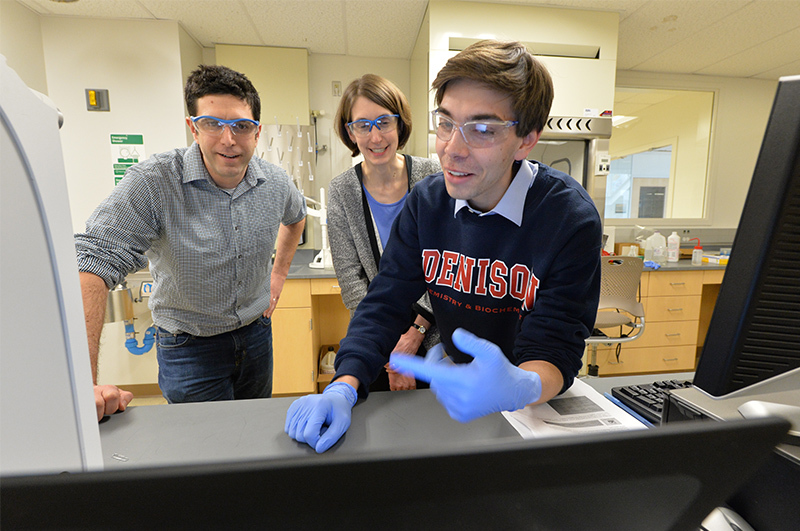At Denison, students get the opportunity to work with their professors on research and that pays off in a big way. “Doing research in chemistry and biochemistry,” says Associate Professor Joe Reczek, “is the single most impactful way for students to learn and become scientists.”
Professors in the sciences often come up with an idea or theory, offer guidance and mentorship, and then the students, Reczek says, get into lab and do a lot of the work and thinking. Reczek and Annabel Edwards, Associate Professor of Chemistry and Biochemistry, have combined in a unique collaboration and have been mentoring Jarrett Dillenburger ’17, a senior Chemistry major, to study dynamic assembly of floating films as potential organic semiconductors from the surface of water.
Collaborating between Reczek’s lab expertise in the synthesis of organic materials, and Edward’s lab expertise in molecular interfaces and thin film characterization, the team worked to understand how the molecular packing of these floating films could be enhanced in order to promote better charge transfer in organic electronics.
“The most important piece of success is keeping a strong attitude in the face of setbacks.”
There were plenty of reasons to think it couldn’t be done, but when Dillenburger launched into the research, he proved them all wrong. Following in the footsteps of Ricardo Antonio ’16, who had spent two years working with Edwards and Reczek on related research, Dillenburger worked with the professors to problem-solve. “He brings a curiosity, a creativity, in how to execute the experiments,” says Reczek. “He’s fearless.”
One way Dillenburger got creative was to use Denison’s 3D printers to make a machine that could lower onto the surface of the water without disrupting it, allowing him to transfer fascinating samples of the floating film for analysis. His small invention proved viable … so much so that he convinced Edwards and Reczek to invest in a commercial machine that would do the same thing to give even better results.
His creativity and this student-faculty research earned Dillenburger one of 4 “Best Poster” honors at the annual conference of the American Chemical Society in April. He, along with senior graduate students from UC-Berkeley, UC-Irvine, and Vanderbilt, beat out over 400 other poster presenters, most of them also graduate students from around the country.
Dillenburger is keeping the Big Red research thread going as he trains Xiangyi “Gloria” Gao ’19 in the work, which Gao will take over when Dillenburger graduates in May to start a PhD program in Chemistry at Penn State University. Reczek hopes he takes that fearlessness and creativity with him into his own research career. “The most important piece of success is keeping a strong attitude in the face of setbacks,” says Reczek. That’s how scientists are built.
